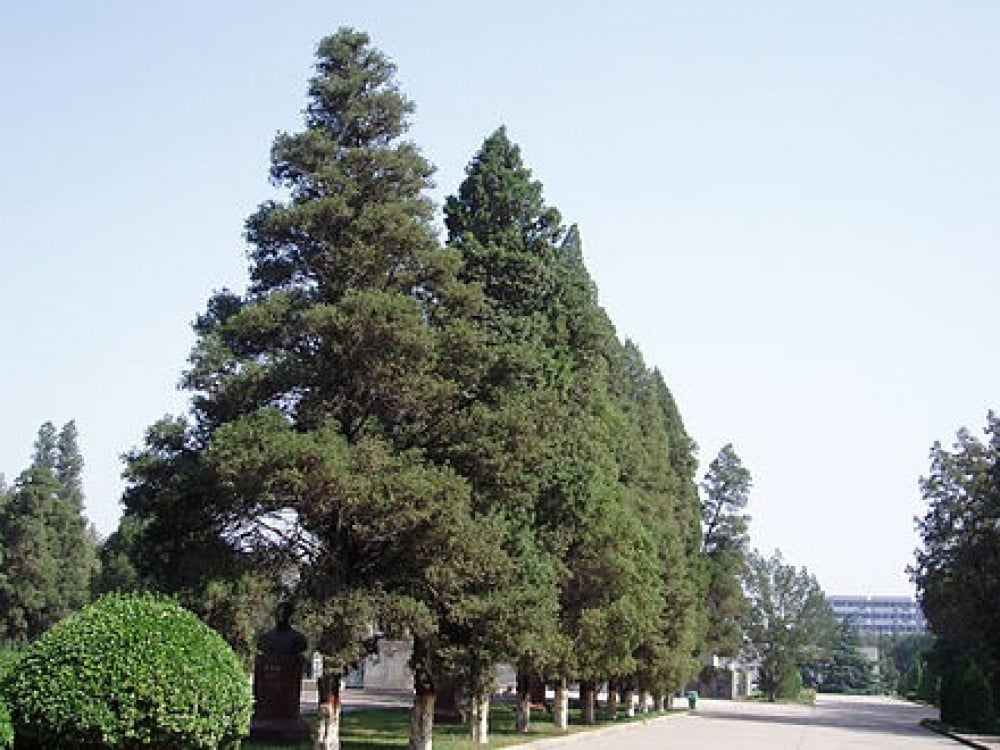Arar (tree)
Juniper _
Juniper : A genus of plants that follows the family Cypress and includes about fifty species of perennial and evergreen plants .
Juniper species
The asshole
Cedar juniper
The Syrian Juniper in the Arab East
Juniper common
Juniper Sherbini in the Arab East and the Arab Maghreb
Chinese juniper in China
Formosan juniper
The Phoenician Juniper in the Arab East
The tall juniper in southwestern Arabia, eastern Sudan and eastern Africa
Hard juniper in Japan Korea , eastern China , and eastern Russia
Juniper short leaves
Juniper is large- fruited
Foul - smelling juniper in western Arabia and the Arab East and the Arab Maghreb and the Mediterranean Basin
Comarovian juniper in China
Juniper of the highlands in the Arab East and Turkey and Greece
Juniper chemical contents
Juniper contains volatile oil, inulin, sugary, resinous, mucilaginous, and waxy substances that taste bitter. It contains many compounds of up to 80 compounds, the most important of which are Pinene, Bionic Lion, Camphene, Cedral, Cedrine, and Sescoterpine. It also contains alkaloids, cardiac glucose, organic acids, in addition to salts of The most important of which is calcium, and one of the most important separated compounds that gave an antibacterial effect, especially the bacteria specific to pulmonary tuberculosis. Two compounds were separated and compared with the antituberculosis drugs given to treat tuberculosis.
Juniper essential oil also contains sabinine , thujone and carine in its composition.
Juniper uses
Juniper wood is used in carpentry . It grows in cold regions, and there are male and female among them, and it forms most of the vegetation cover, starting from Taif to the end of the Hijaz mountain range in the south. It is said that juniper trees are hundreds of years old. Juniper has a pleasant smell when burned, the juniper plant is a seedless plant, and it has been proven that juniper trees are the oldest juniper trees that live in the Kingdom, as it is not surprising to discover that some of these trees are thousands of years old.
There are several types of junipers, the most important of which are: J.phoenicea and Juniperus Procera. The first type is the most known to the general public and has blue-to-purple blue-to-violet fruits, while the second type has a brown color and is usually smaller in size than the first type. The fruits of juniper have a sweet taste followed by bitterness with Easy catch. The branches and trunks of juniper trees secrete a resinous substance in the form of small tears, similar in appearance to mastic, except that it is darker in color.
Juniper is used on a large scale, and it is used in the areas where it grows to prepare black tar and prepare tar oil, which is called “Safwa.” Tar and its pure oil are used for many purposes. It is also applied to some ceilings of wooden houses as an antidote to termites, a type of wood-eating termites. As for tar oil, known as al-Safwa, it is widely used to kill monkeys and fleas in sheep, as well as scabies and kill lice and nits that form in the hair of the head. One of the best medicines in this field is juniper leaves. Popularly fresh in the form of an infusion for the treatment of pulmonary tuberculosis in the areas where this plant grows, and it is also used for some cases of asthma, in addition to the infusion of dry juniper leaves that relieves jaundice, and juniper fruits are also used as a carob for skin vessels after tanning, especially those that preserve ghee and honey, and the method That the fruits are taken when they are fully ripe, then cooked with a small amount of water until they melt and become like thick honey, then cooled and placed inside the leather container that is on it. A small container, and this liquid is left in the container for a long time, then it comes out of it, and after that it can be filled with ghee or honey, so the ghee or honey will remain for many years without any damage or any effect, and its smell or taste does not change.
Juniper was mentioned in pharaonic recipes in the Hearst and Ebers papyrus as therapeutic prescriptions for relieving pain, heart disease, epilepsy, treating urinary tract infections, diuresis, relieving renal colic, against fevers, diuretics, and removing joint pain and rheumatism . Topically for the treatment of burns, and the pharaohs made a drink from the fruits of juniper against tapeworm and for the treatment of intestinal infections and for the treatment of cough and asthma . Muscles, chest pains, and coughing, it purifies and opens the plugs in it, and it is for the stomach a drink, good for uterine distress and pains.” Ibn Al-Bitar said: “Juniper is heated and soothing to remove the harm of stinging vermin and expelling vermin and flies by smoking.” David of Antioch said: “Juniper is hot in the first place, its promise is cold, and its fruit is hot.” In the second, it is all dry, in the third, it seals the wounds, retains the blood, softens it, reduces sores where they were, analyzes the tumors, removes the fumes, especially leprosy, with paint and drink.Gargling with its cooking soothes toothaches and sore gums and tightens its softness, and its soft fruit tightens and welds the hernia, eating and bandaging, even if it is kneaded with honey and licked the sores of chronic cough. Fruit it with water and vinegar and cook it with oil to paint the hair blacken it and prevent it from falling out, as well as to heal the fracture, joint bruises and nerve weakness.
Medicinal uses
Its leaves and grains have many medical uses in herbal medicine, because they are antiseptic, diuretic, stimulant and carminative. Juniper seed infusion helps in cases of bloating and indigestion. The decoction of the branches is used to treat articular and muscular rheumatism . Juniper grains are used in the manufacture of many medicines, for the treatment of tapeworms, abdominal, anal and asthma treatment. Juniper wood boiler is used to treat chronic skin diseases.
As for modern medicine, it says about juniper:
Good for chest pains, intestinal gases, coughing, and uterine distress. A decoction of juniper fruits is used at a rate of 25 tablets per cup of water, and the appropriate dose is three cups per day.
Juniper leaf drink is used at a rate of 25 gm + 180 ml boiling water + 5 gm potassium nitrate + 15 gm pure honey, and the dose is from 2 to 3 cups daily, in order to treat dysuria, urinary tract stones, and dropsy.
Juniper decoction is used 20 gm per cup of water and the dose is 3-4 cups per day in order to treat chronic skin diseases, pimples and boils. Juniper is used more in medicinal preparations than it is used in food, but this does not prevent us from benefiting from its properties that make some birds accept it so greedily that their meat becomes aromatic and clear and repulsive to eaters. In some European countries, a powder of juniper and barley is made, which is drunk instead of coffee.
Juniper puree is made from fully ripe juniper granules after immersing them in water and boiling them for an hour, then they are crushed and filtered with a strainer and sugar is added to them, then returned to the fire until we have a viscous liquid that is placed in containers and preserved as jam is preserved.
Juniper seeds are used to treat bad breath and heaviness in the stomach, by taking six to ten pills for the infected person. As for Harlem oil, which is used by people with renal colic, it is extracted from juniper turpentine. Juniper seeds are useful in treating hiccups, as it is taken as a powder and dissolved in water at a rate of twenty-five grains per liter, and it can be sweetened with sugar.

